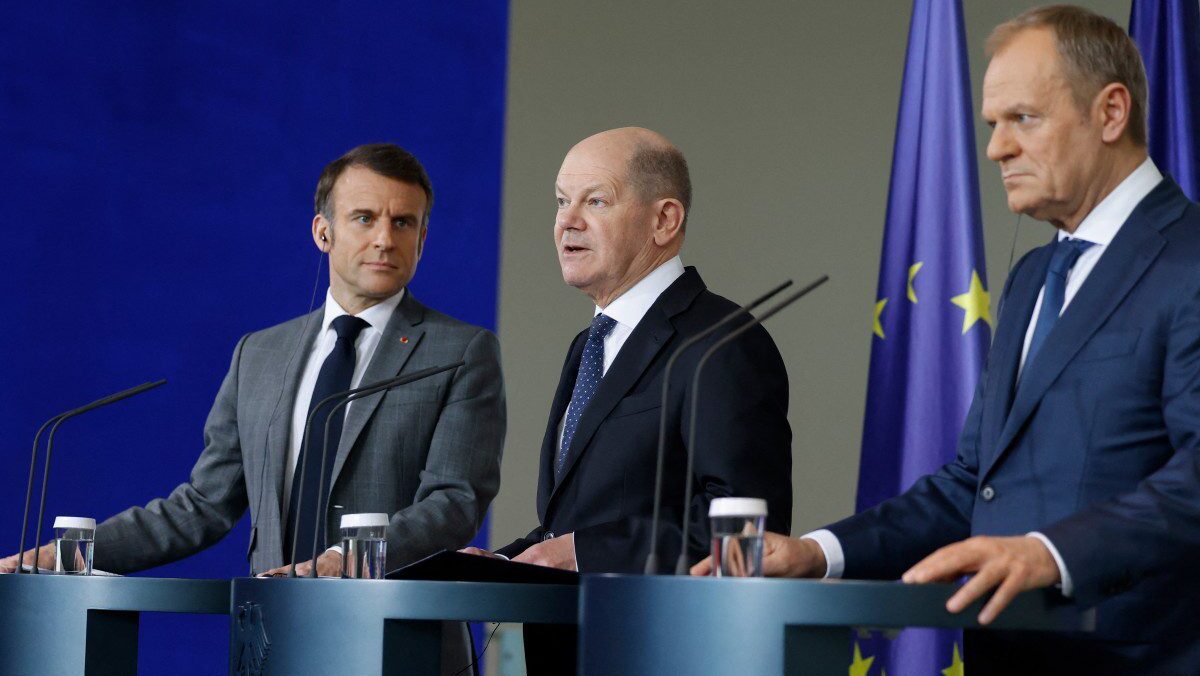
French President Emmanuel Macron, German Chancellor Olaf Scholz and Polish Prime Minister Donald Tusk address a press conference at the Chancellery in Berlin on March 15th, 2024.
Photo: ODD ANDERSEN / AFP
With Ukraine’s military strapped for weapons and manpower and close to crumbling in the face of the Russian onslaught, the leaders of Germany, France, and Poland held a crisis meeting in Berlin on Friday to determine how best to continue lending the country much-needed military aid.
At German Chancellor Olaf Scholz’s last-minute invitation, French President Emmanuel Macron and Polish Prime Minister Donald Tusk traveled to the German Chancellery.
The three major European powers make up the so-called ‘Weimar Triangle,’ a regional alliance created in 1991 in the German city of Weimar following the break-up of the Soviet Union. Strained relations with the previous Polish government, under the Rightist Law and Justice party, had led to the format lying relatively dormant for a few years.
As the trio held a press conference after the meeting. Scholz stressed that “all three of us are serious about our support for Ukraine. More than ever, he said, “Our unity is our strength. We will not let up in our support.”
The demonstration of unity comes after a major disagreement between Chancellor Scholz and President Macron on Ukraine policy. The latter recently suggested that deploying European militaries in Ukraine should not be ruled out—a course of action Scholz, together with many other European leaders, rejected out of hand.
Following consultations with his counterparts, Chancellor Olaf Scholz announced other measures that could be taken to support Ukraine in its war against Russia.
With Europe’s arsenals running low, Scholz said they would “procure even more weapons—on the entire global market,” paid for by windfall profits on frozen Russian assets. In addition, the trio is looking for expanded production of military equipment, including on Ukrainian soil.
The defense ministers of the three EU countries will discuss specific details next Monday. “We stand closely and unwaveringly by Ukraine’s side. That means: as long as it takes,” Scholz continued, emphasizing it was “also clear that we are not at war with Russia.”
Scholz also attempted to downplay the rumored animosity between him and Macron. “Emmanuel Macron and I have a very good personal relationship,” he said, “I would call it very friendly.”
His blank refusal to deploy Western troops in Ukraine has not changed, however. Neither has Macron’s refusal to rule it out.
Only the evening before, during a televised interview, the French president reiterated that “all options remain open” to put a stop to Russia in Ukraine.T hose who rule out options are “not choosing peace, but defeat,” Macron said. “If the situation deteriorates, we must be ready so that Russia never wins.”
However, he also assured that France, as a nuclear power, had a “special responsibility” to avoid verbal and actual escalations and that his country would never go on the offensive.
That distinction has no bearing on Moscow’s decision-making on which forces it will treat as hostile, however.
During his annual State of the Nation address in late February, Russian President Vladimir Putin warned that any deployment of Western troops in Ukraine—whether acting offensively or not—would have “tragic” consequences.
The last to speak, Polish leader Donald Tusk stressed that “everything that we decided in an excellent atmosphere clearly shows that the ugly rumors of disagreement among us, among Europe’s capitals, are false.”
